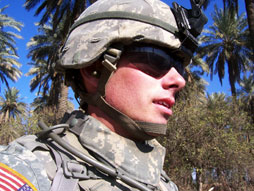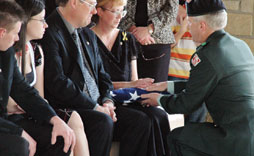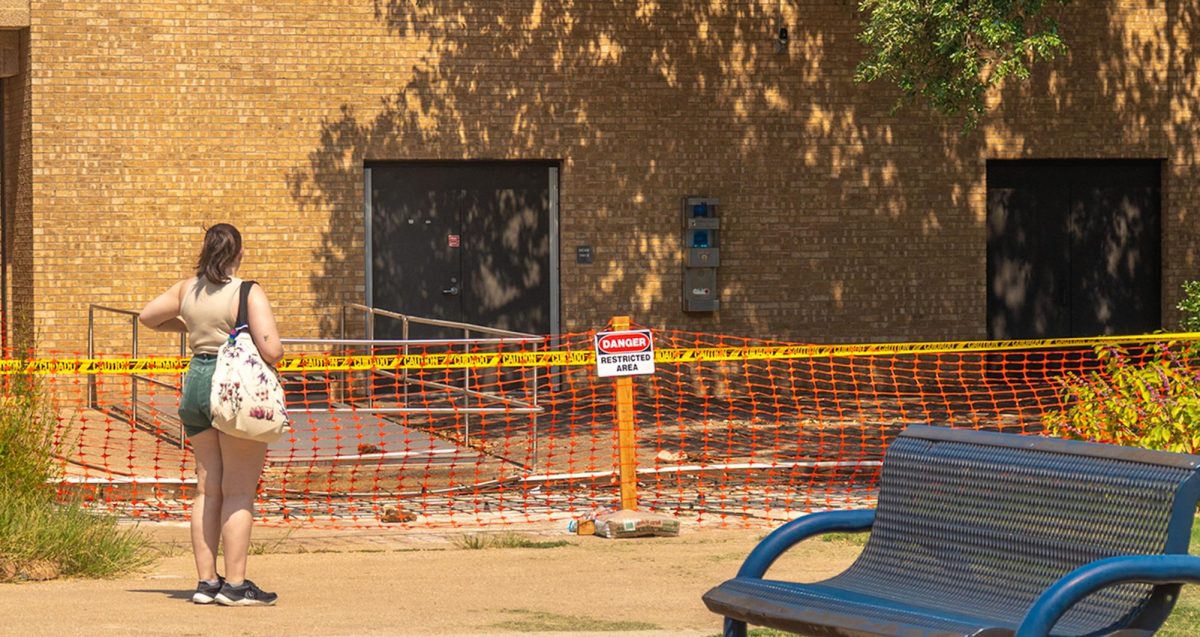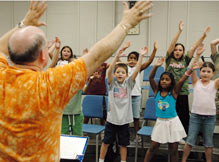By Charity Montieth and André Green/reporters

As long as his father can remember, Sgt. Lance Craig Springer II always wanted to join the Army.
He joined the Boy Scouts as soon as he was old enough and remained a scout until he was too old.
In 2005, he joined the Army.
Springer said he initially had reservations about his oldest son joining the military knowing there was a great possibility he would be deployed to Iraq, but he said his faith overruled his fear.
“ I had a concern about it, but I am a religious man so I prayed about it,” he said. “[Craig] believed he might get hurt, but he knew he would come back.”
Sgt. Springer died March 23 while serving his country in Iraq.
As a child, his favorite pastime was fishing with his dad. Although the elder Springer usually caught the biggest fish, he would often let the youngster reel it in.
“ Craig commented once that his favorite childhood memory was fishing with his dad,” his father Lance Springer said. “He was a good fisherman.”
After receiving a car from his father as a gift, Craig soon needed a replacement for his thrill-seeking nature. His next vehicle, a Jeep, was bought for off-roading with his friends, Springer said.

He would often have contests with his friends to see who could get the muddiest. His father said he often won.
He was the oldest of three and a typical teenager who loved working on his truck so much that he obtained his associate degree at TCC in automotive repair.
Craig’s dream was to apply his mechanical skills in the Army, but he was deterred because he was color-blind, his father said. Instead, the Army placed him in an alternate job as an airborne combat medic assigned to the 1st Squadron, 40th Cavalry Regiment, 4th Airborne Brigade Combat Team, 25th Infantry Division. This is where he would eventually see combat on the front lines in Baghdad.
“ I think he actually liked being a combat medic better,” he said. “He liked the idea of being the first person to offer help out on the front lines.”
While on his first patrol in Iraq, his unit was attacked by insurgents. During the attack, the unit’s Iraqi interpreter and an American soldier sustained minor gunshot wounds. Craig was on the scene to offer medical assistance.
“ He was awarded a combat medic badge his first time out. Of all the awards he received, he’d be the most proud of that,” Springer said.
Following the incident, Craig and his unit continued running reconnaissance and security missions.
“ They saw a lot of bad stuff; everywhere they went someone was trying to take a pot shot at them,”
Springer said.
In spite of this, Craig used his weapon only twice. The first was at an active shooter. The second was a lengthy firefight against insurgents who had opened fire on a security checkpoint using rocket-propelled grenades. During that incident, Craig fired only 45 rounds. There were no American casualties in either incident.
Springer said the family often communicated with Craig via telephone, e-mail and instant messaging. They were pleased to know Craig was making the most out of a bad situation.
“ Craig would get frustrated sometimes because they came under fire so often, but he was generally in good spirits,” Springer said. “He especially like parachuting into Iraq with his unit.”
In mid-January, Springer came home on his two-week leave. During that time, he bought another gun to add to his collection—a civilian issue M-4 assault rifle.
“ He said he felt naked without his assault rifle,” Springer said.
Craig took the rifle out to his grandparents’ house in the East Texas countryside where the entire family took turns firing it.
It was the last time Craig would spend with his family.
According to the Army’s after action report, while out clearing a road for an upcoming convoy with his unit, Craig was about to discover a wire that was connected to an improvised explosive device (IED) in a bush approximately 300 yards away. As he drew closer, the bomb was detonated, killing Craig.
He was 23 years old.
“ The guy who was hiding in the bush must have panicked because he detonated the device,” Springer said.
Craig was the only casualty that day.
“ My son lost his life, but only one soldier died instead of an entire vehicle being taken out,” Springer said.
In addition to receiving the Bronze Star and Purple Heart, Craig was posthumously promoted to sergeant.
Just 24 hours before his death, Craig called home to tell his family about a church service he had attended—the first time he had been able to attend church since his deployment. The sermon, which covered John 9, inspired the soldier.
“ He was so excited about the blessing he had received at church,” Springer said. “He said he couldn’t explain it the way the preacher did, but he described it as a scripture of comfort.”
On Friday, March 23, Springer’s teenage daughter, Michelle opened the door and was greeted by an Army representative and chaplain. Neither Springer nor his wife, Evanna was home at the time. When Evanna returned home, Michelle told her mother about the visitors.
“ My wife called me at work and said an Army chaplain had been to the house,” Springer said. “They wouldn’t tell Michelle what had happened, but when she said the chaplain came, I knew it was bad.”
Of the family members, the children, Chris and Michelle, took the news the hardest, Springer said.
“ They were all very close, and they were distraught to lose their older brother,” he said.
In the month since Craig’s death, Springer has encouraged his family to go back to business as usual, but said his family is relying upon their religion for strength and healing.
Springer recalled one night in particular that offered him some comfort.
While sitting on his couch with his Bible in his lap, he said he needed a scripture to get by, but did not know where to start.
“ I asked the Lord for guidance, closed my eyes, opened my Bible and just pointed,” he said.
“
The words ‘dead with Christ’ from Colossians 2:20 were under my finger. That let me know Craig was with Christ.”
Springer is not bitter or angry about the circumstances in Iraq. On the contrary, he believes his son’s path was his mission from the Lord.
“ Craig didn’t like being shot at, but he truly believed in what he was doing and was willing to die for it,” he said.
When he thinks about the other families who have lost loved ones, he said he hopes they find comfort eventually. Springer said the pain of losing not only a son, but a friend as well is enormous, but the family has to heal and move on.
“ People handle grief in different ways,” he said. “While others protest the war, I prefer to be patriotic.”
It was his son’s giving nature that used small gestures to make positive experiences for the children in a country ravaged by war. Relatives and friends often asked Craig what to send in care packages. He asked for only one thing.
“ He always carried something small for the Iraqi children. Usually a piece of gum, Life Savers or even a small teddy bear,” Springer said.
Although his son wanted the war to be over, Springer said Craig recognized the need for America’s presence.
“ All we hear from the media is the bad news, the casualties. What we don’t hear is that we have captured thousands of insurgents, discovered a lot of weapons, secured areas and made it more difficult for terrorists to carry out operations,” Springer said.
With a majority of Americans sharing opposing views on the war, Springer said he understands many parents are apprehensive about allowing their children to join the military.
“ But what you have to remember is if no one joined the military, how long would we stay free? We wouldn’t,” he said.
“ Of course we miss our son. But we have thought of it as a long deployment, and we will see him again one day.”























